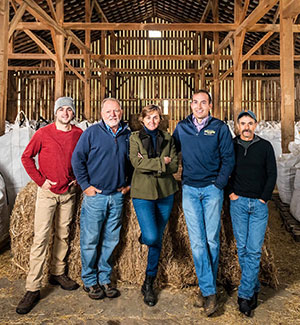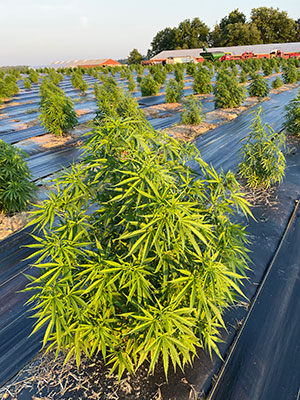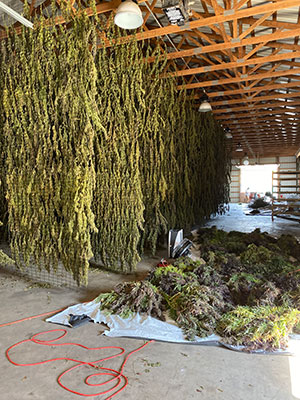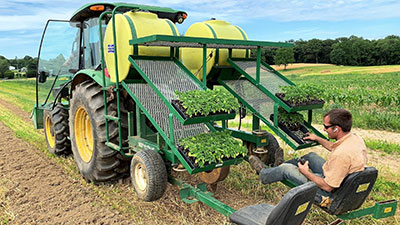
Chester County Ag Council
Home | Farm Guide | 2021 Farm Guide Feature
A feature from the 2021 Farm Prodcuts Guide.
“I saw our broken healthcare system and I wanted to make a difference.”
Although hemp played a critical role in the formation of the United States, growing it was banned for nearly a century due to misplaced fears over its close association with the marijuana plant. However, recent changes to national and state legislation have opened opportunities for enterprising growers willing to navigate a new and occasionally fraught market.
In colonial times, hemp was used to produce everything from the paper on which the Declaration of Independence was written to the fabric covers for the Conestoga wagons that traveled across the country.
Lawmakers banned the production of hemp and marijuana during the Prohibition Era in the 1930s due to concerns over a single cannabinoid, THC (tetrahydrocannabinol), the psychoactive ingredient associated with feelings of euphoria found in high levels in marijuana. However, industrial hemp contains 100 times less THC than its potent cousin, lacking the narcotic effects.
 The 2018 Farm Bill recognized this difference and removed industrial hemp from regulation under the Controlled Substances Act, creating opportunity for local entrepreneurs like Hemp-Alternative CEO Cynthia Petrone-Hudock.
The 2018 Farm Bill recognized this difference and removed industrial hemp from regulation under the Controlled Substances Act, creating opportunity for local entrepreneurs like Hemp-Alternative CEO Cynthia Petrone-Hudock.
One of 30 permitted growers in Chester County, Petrone-Hudock and her team believe hemp is poised to return to prominence as a source of environmentally friendly products, food and cannabinoid based alternative medicine (CBD for instance, another cannabinoid from the hemp plant being studied for use to treat pain, epilepsy and inflammatory disorders).
Petrone-Hudock wasn't always involved in agriculture. She began her career in banking, but taking care of her father through his long illness inspired her to go a different path.
"I saw our broken healthcare system and I wanted to make a difference," she says, so she transitioned into healthcare IT.
Petrone-Hudock then realized there was an opportunity for companies looking to provide alternative medicine to a growing geriatric population and those managing chronic pain illnesses without the unpleasant side effects associated with commonly prescribed painkillers like opioids.
Partnering with 4th generation crop farmer Jamie Hicks of Hicks Brothers Farming in Kennett Square helped make her vision a reality. Hicks has many years of experience growing traditional crops like corn, soybeans, wheat and hay, but was already looking into hemp production when approached by Petrone-Hudock.
 "I'm drawn to the challenge of developing a market for a new crop," he says.
"I'm drawn to the challenge of developing a market for a new crop," he says.
Hicks brought in specialty crop grower Juan Medina to the Hemp-Alternative team to help manage the incredibly specific way hemp needs to be grown and harvested for high cannabinoid productivity while meeting stringent government regulation.
After only three years of operation, the group now grows hemp for both cannabinoids and fiber in multiple counties in Pennsylvania and Maryland. They also provide hemp industry expertise, seed sourcing and cultivation services for the larger farming community.
 Regional research and educational institutions have started to take note. Hemp-Alternative is actively partnering with Stroud Water Research Center in Avondale. They will measure soil characteristics, plant growth and nutrient content, and rainwater infiltration to better understand how the widespread adoption of this crop may affect our landscapes, particularly the impact or benefit for water quality and quantity in our freshwater ecosystems that are an integral part of the agricultural landscape.
Regional research and educational institutions have started to take note. Hemp-Alternative is actively partnering with Stroud Water Research Center in Avondale. They will measure soil characteristics, plant growth and nutrient content, and rainwater infiltration to better understand how the widespread adoption of this crop may affect our landscapes, particularly the impact or benefit for water quality and quantity in our freshwater ecosystems that are an integral part of the agricultural landscape.
Hemp-Alternative is also working with Jefferson University, Kanbar College of Design, Engineering & Commerce on sustainable product development, particularly looking into a line of sustainable garden products, a good fit for a company located outside of Philadelphia, "America's Garden Capital."
There are even plans with a local mill in the works to create a high energy, high protein snack with a charitable mission to help food-insecure communities.
Despite all these promising opportunities, growing hemp is not without significant risk. Financial return can be slow as growing and processing a novel crop takes specialized equipment, know-how and ongoing, complicated testing. The initial investment can be high.
Petrone-Hudock cautions new growers to invest their time and money slowly — and do their homework.
"The lack of education is the crux of most of the risk," she says. "We are tackling an emerging industry that is a regulatory hotbed, rules and regulations are evolving and we need to help lawmakers and the public understand what hemp is and isn't."
 There are also ongoing banking challenges. Financial institutions were only allowed to start offering financial services to hemp growing operations in 2018 thanks to the Farm Bill and many are still wary to get involved in this new market.
There are also ongoing banking challenges. Financial institutions were only allowed to start offering financial services to hemp growing operations in 2018 thanks to the Farm Bill and many are still wary to get involved in this new market.
But Petrone-Hudock sees reason for optimism regarding this rising tide industry. "There is a swell of momentum, regulators and physicians are feeling the pressure from patients to learn more about the value of cannabinoids to your health and the fiber plant to our earth" says Petrone-Hudock. "With more education and evidence-based research, the hemp movement may actually turn out to be a hemp revolution. That's why I sit on the PA hemp steering committee."
Learn more at www.hemp-alternative.com.